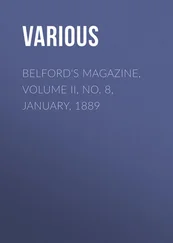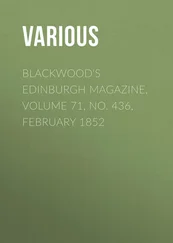Various - Belford's Magazine, Vol. II, No. 3, February 1889
Здесь есть возможность читать онлайн «Various - Belford's Magazine, Vol. II, No. 3, February 1889» — ознакомительный отрывок электронной книги совершенно бесплатно, а после прочтения отрывка купить полную версию. В некоторых случаях можно слушать аудио, скачать через торрент в формате fb2 и присутствует краткое содержание. Издательство: Иностранный паблик, Жанр: periodic, foreign_edu, на английском языке. Описание произведения, (предисловие) а так же отзывы посетителей доступны на портале библиотеки ЛибКат.
- Название:Belford's Magazine, Vol. II, No. 3, February 1889
- Автор:
- Издательство:Иностранный паблик
- Жанр:
- Год:неизвестен
- ISBN:нет данных
- Рейтинг книги:5 / 5. Голосов: 1
-
Избранное:Добавить в избранное
- Отзывы:
-
Ваша оценка:
- 100
- 1
- 2
- 3
- 4
- 5
Belford's Magazine, Vol. II, No. 3, February 1889: краткое содержание, описание и аннотация
Предлагаем к чтению аннотацию, описание, краткое содержание или предисловие (зависит от того, что написал сам автор книги «Belford's Magazine, Vol. II, No. 3, February 1889»). Если вы не нашли необходимую информацию о книге — напишите в комментариях, мы постараемся отыскать её.
Belford's Magazine, Vol. II, No. 3, February 1889 — читать онлайн ознакомительный отрывок
Ниже представлен текст книги, разбитый по страницам. Система сохранения места последней прочитанной страницы, позволяет с удобством читать онлайн бесплатно книгу «Belford's Magazine, Vol. II, No. 3, February 1889», без необходимости каждый раз заново искать на чём Вы остановились. Поставьте закладку, и сможете в любой момент перейти на страницу, на которой закончили чтение.
Интервал:
Закладка:
It was certainly a grotesque but pathetic spectacle, that of these people just escaped from bondage, all ragged, many of them with scarce tatters enough for decency, barefooted and bareheaded, or with handkerchiefs around their heads, dirty and forlorn, each one carrying a little bundle containing his entire earthly possessions.
Immediately upon their arrival at the barracks the men were examined, the able-bodied ones enlisted, the rest otherwise disposed of.
Before the 1st of August the 2d and 4th regiments were complete, the 7th and 8th more than half full, and the 9th was begun. 1 1 The intermediate regiments were raised in Boston, Philadelphia, and in Ohio.
It was surprising how many men had to be rejected. Sometimes out of a hundred recruits fifty would be found physically unfit for service. But those accepted were, as a rule, fine, hearty fellows.
The preliminary process to becoming a soldier was not always relished. The carbolic soap bath in the river, with the after clipping and shaving and shampooing, being in many cases a first experience, was not submitted to in every instance without grumbling. A few even rebelled, positively refusing to go into the water. A facetious sergeant, detailed to supervise the scrubbing, originated an argument which proved most effective.
"Look at you now," he was heard to say, "you ignorant nigger! You don't know nothin'. Don't you see your ole close a burnin' up on de sho', and don't you know when you gits inter dat ribber and scrubs wid de guvment soap you washes all de slavery out ob you? Go 'long wid you!"
And the subject, aided by a touch of the sergeant's foot, would make no further resistance.
But when, the bath and barbering over, comfortable under-clothing was given them and they were then arrayed in bright new uniforms and a glittering musket was put into their hands, surely Solomon in all his glory never experienced the glow of satisfaction that warmed the hearts of these ex-slaves as they viewed each other, and each man knew that he looked just like his fellows. For the first time in their lives they were men, not "boys," – not chattels to be disposed of at the will of a master, but owning themselves, treated with respect, and considered worthy to take part with white men in defending the Union. In many of them the almost immediate change in look and bearing from cringing humility or unmeaning levity to earnest willingness and self-confidence was strikingly apparent; in others the change came gradually, as though time were needed to make them realize the revolution that had taken place. But it was surprising how quickly the vast majority learned well what was required of them, and how few rascals there were. Intemperance and profanity were exceedingly rare among them, and the guard-house opened its doors to a much less number than was usual in white regiments.
Of course there was general dissatisfaction among the abandoned masters and mistresses, many of whom were left without a single field-hand or house-servant. Scarcely a day passed without bringing one or two of these owners or their agents to inquire for some Sam or Tom or Dick. They were always invited up to headquarters to present their claims, and the records were examined for their satisfaction. If the names of their slaves were among the enlisted men, the ex-owners were required to produce a certificate of loyalty from the provost marshal of their district; and, if this was satisfactory, they were referred to the Board of Claims, to be organized in Baltimore for the purpose of deciding upon such cases. If they could show no proper certificate, they were summarily dismissed. Very often a man would change his name when he enlisted, thus making it very difficult for his master to trace him, besides causing confusion and a good deal of merriment among the young officers, as those who took new names invariably forgot them.
"Andy Smith!" the sergeant would cry at roll-call; but no Andy Smith would answer until, the name having been repeated several times, some comrade would nudge the fellow who had assumed it, saying:
"You is Andy Smith; don't you 'member you is?"
And then there would be a start and an exclamation of:
"So I is – I done forgot!" followed by a loud "Here!"
Amusing and sometimes pathetic scenes between masters and servants were of frequent occurrence. It was surprising in how short a time a poor, crying, slovenly slave became a bright, neat, self-asserting man.
One morning a tall, ungainly fellow, who had tramped several days to get to us, was brought to headquarters. He looked as though he had been driven and hunted all his life; but he was strongly built, and his ebony countenance, though showing a good deal of anxiety, expressed fearlessness and resolution. The officer who accompanied him reported him sound in every way except that he stuttered badly. Before the Colonel could speak to him, the fellow managed, with much difficulty, to get out an earnest request that he should not be "'jected."
"But you could not give the countersign if challenged," said the colonel.
"Jes try me, please, mars Colonel," the poor man stuttered. He was tried with the regular drill orders, and the proof of the man's pluck was that, though surrounded by a crowd that laughed at his ridiculous efforts, he made an heroic stagger at every order, and with a certain air of dignity that had its effect. At any rate, the Colonel, pleased with his manly bearing, told him that if he would come up the next morning and give those orders without stuttering he should be mustered into the service. Whether what his comrades asserted, that he spent the night practising in the grove back of the barracks, was true or not, it is a fact that the next morning he appeared bright and cheery, and in a voice that resounded over the campus he repeated every order promptly and intelligibly. He was accepted and a few days afterwards put on guard at the foot of the hill. As he was quietly pacing up and down his beat, a man rode up, sprang to the ground, and saying, "Look after my horse, fellow," started to walk up the hill. He failed to recognize in the neat, fine-looking soldier whom he had addressed his runaway slave. But the slave knew his late master, and with the sense of security inspired by his uniform and his loaded musket, he stepped forward. He could now say "Halt!" without stuttering, and he said it in a very decided tone. And then the master, looking sharply at him, exclaimed with an oath:
"Sam, you stuttering idiot! what are you doing here?"
"Defendin' de country, mas – sa," Sam stuttered.
His master burst out laughing, and with another oath ordered Sam to stand aside and let him pass, as he had come to take his man back home, and intended to do it. But Sam was not alarmed. He lowered his musket significantly, and managed to say:
"I aint nobody's slave no more, massa. I'se under the orders of de United States Guvement, and dem orders is to let nobody parss here what can't gib de countersign. Ef you kin do dat, you kin parss: ef not – not!"
The master raved and stormed in vain. Sam stood firm, until the officer of the day who, unobserved, had witnessed the scene from a clump of trees, thought best to interfere. He escorted the irate Marylander to the Colonel's office, but it is hardly necessary to say he was obliged to return home alone, as he came. 2 2 Sam was a member of the 7th regiment, and in battle was distinguished for his bravery. He was killed Oct. 27, 1864, in the battle near "Kill House," Va.
A very similar incident occurred shortly afterwards, which I believe found its way into the papers: but it will bear repetition.
A new recruit, feeling to an exaggerated extent the dignity and the importance with which his uniform invested him, and realizing also, perhaps, the solemn obligations of his oath, was approached while on guard by his former master, and, with the usual oaths, ordered to get out of the way. This the sentinel declined to do, and the master began to abuse him for "a coward," "a black scoundrel," "a sneaking thief," etc., etc., all of which the soldier bore unmoved. But when the white man, still more infuriated by this indifference, damned the Union Army and even the uniform the black man wore, the latter became excited, and facing his angry master, said, in a very forcible manner:
Читать дальшеИнтервал:
Закладка:
Похожие книги на «Belford's Magazine, Vol. II, No. 3, February 1889»
Представляем Вашему вниманию похожие книги на «Belford's Magazine, Vol. II, No. 3, February 1889» списком для выбора. Мы отобрали схожую по названию и смыслу литературу в надежде предоставить читателям больше вариантов отыскать новые, интересные, ещё непрочитанные произведения.
Обсуждение, отзывы о книге «Belford's Magazine, Vol. II, No. 3, February 1889» и просто собственные мнения читателей. Оставьте ваши комментарии, напишите, что Вы думаете о произведении, его смысле или главных героях. Укажите что конкретно понравилось, а что нет, и почему Вы так считаете.












